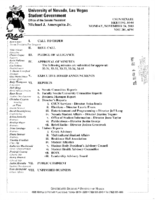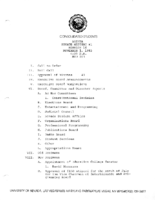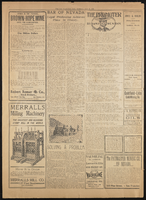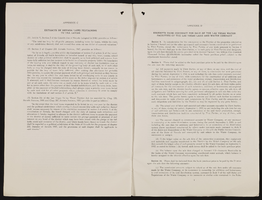Search the Special Collections and Archives Portal
Search Results
Nevada Women’s Conference Photograph Collection
Identifier
Abstract
The Nevada Women’s Conference Photograph Collection depicts the statewide women’s conference held in June 1977 in Las Vegas, Nevada. The photographs include keynote speaker Gloria Steinem, event organizers, workshops, volunteers, and musical performances.
Archival Collection
Grace Hayes Papers
Identifier
Abstract
The Grace Hayes Papers (1900-1989) include personal papers and financial papers pertaining to the Grace Hayes Lodge (formerly the Red Rooster), a nightclub on the Strip in Las Vegas, Nevada. The collection includes financial documents, newspaper clippings about Hayes and her family, personal correspondence, career mementos, legal documents, and photograph albums.
Archival Collection

Casiano Corpus Jr. oral history interview: transcript
Date
Archival Collection
Description
Oral history interview with Casiano Corpus Jr. conducted by Cecilia Winchell and Stefani Evans on February 14, 2023 for the Reflections: the Las Vegas Asian American and Pacific Islander Oral History Project. In this interview, Corpus Jr. details a difficult childhood in the Philippines, where society is highly socioeconomically stratified. He recalls his parents working a number of jobs to support their large family, and as soon as he finished his primary schooling, he also started working in construction. When his father was finally petitioned by his uncle to move to the United States, Corpus was at first reluctant to go, since he had a familiar life in the Philippines, but has come to love the United States and the life he created for himself. Immediately after moving to the United States, their family landed in Las Vegas, Nevada, and Corpus began working a number of jobs. He started out as a busboy at a Chinese restaurant before deciding that he wanted to work in a casino and moved to Union Plaza. His current job is as a porter at Palace Station, where he has been for the past 31 years. He has also been working to unionize Palace Station and Station casinos with the Culinary Union for the past twelve years. He talks about the hunger strike he organized, why he organizes with no fear, and what he hopes to see out of his efforts throughout the interview.
Text
Richard Ronzone Photographs
Identifier
Abstract
The Richard Ronzone Photographs depict Las Vegas, Nevada storeowner and politician Richard “Dick” Ronzone and his family from 1920 to 1989 and 2001. The photographs primarily depict Ronzone at Ronzone’s Store in Las Vegas, at events with politicians such as Nevada Governor Paul Laxalt, or at the Las Vegas Valley Water District. The photographs also depict Ronzone during his service with the Nevada National Guard; portraits of Ronzone, his wife Ann Roeth Ronzone, and his mother Bertha Ronzone; and events during Ronzone’s tenure as a Clark County Commissioner from 1972 to 1980.
Archival Collection

Pom Fritz oral history interview: transcript
Date
Archival Collection
Description
Oral history interview with Pom Fritz conducted by Kristel Peralta and Stefani Evans on June 8, 2021 for Reflections: The Las Vegas Asian American and Pacific Islander Oral History Project. Pom talks about her family and upbringing in Udon Thani, Thailand and her immigration to the United States with her second husband, an American citizen, in 1972. She discusses living on Air Force bases in North Carolina and California before moving to Las Vegas and finding work at different hotels. Pom shares her experiences as a member, steward, and executive board representative of the Culinary Workers Union and what she recalls from the Frontier Strike. She also talks about her children and grandchildren, some of whom still live in Thailand.
Text

Meeting minutes for Consolidated Student Senate, University of Nevada, Las Vegas, November 24, 2004
Date
Archival Collection
Description
Text

Transcript of interview with Dr. John Shepherd by Lisa Gioia-Acres, November 21, 2008
Date
Archival Collection
Description
Dr. John Richard Shepherd shares the background of his early life in southern Illinois, his father's and grandfather's occupations, and his educational journey through college and medical school. His army experiences in Chicago and Alabama convinced him and his wife to look for a warm dry climate in which to live, and they relocated to Las Vegas in 1968. Dr. Shepherd recalls the businesses and housing surrounding Sunrise Hospital, the difficulties getting his specialty listed in the phone book, and renting his first office space from Nate Adelson. He also describes taking out a loan to install ophthalmology equipment, hiring an office manager with medical accounting experience, and doing cataract surgery in a way that basically hadn't changed for decades. The passing of the Medicare bill back in 1966 caused Dr. Shepherd's practice to build up quickly. He details the many ways eye surgery changed, including the invention of the intraocular lens and the phacoemulsification procedure. He mentions his and Dr. Shearing's contributions to ophthalmology — better designed lenses and surgical techniques - which they taught to other doctors from all over the country. Dr. Shepherd discusses radial keratotomy, which was a precursor to laser and later LASIK surgery, and describes a lens implant technique he learned in Russia from Dr. Fyodorov. He goes on to share anecdotes and stories of his interactions with patients, his travels as a consultant and as a surgical teacher for Project Orbis, and meeting Fidel Castro. He speaks candidly about his successes and his failures as well. Dr. Shepherd retired in 2006 and immediately enrolled in a Master's program and earned a degree in military history. After a long and distinguished career, after receiving many accolades and awards, he and his wife are enjoying life, splitting their time between Sun Valley, Idaho, and Las Vegas.
Text

Meeting minutes for Consolidated Student Senate, University of Nevada, Las Vegas, November 1, 1983
Date
Archival Collection
Description
Text


